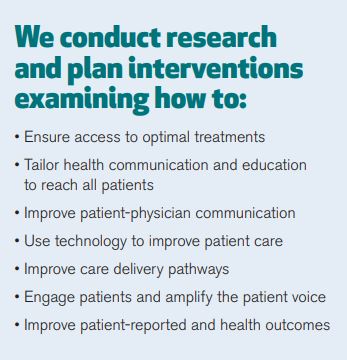Areas of Focus

Federally-Funded Research
Ensuring Informed Decision-Making for Paired Kidney Donation (Project Lead: Amy Waterman, PhD)
This project was funded by the Health Resources and Services Administration (HRSA). The study designed a new and improved, health literate KPD and living donation digital educational curriculum and assessed its effectiveness for increasing living donation and kidney paired donation (KPD) decision-making for potential living donors and transplant candidates.
Multilevel Intervention Strategies to Transform Kidney Care & Improve Pursuit of Transplant in an Integrated Healthcare Delivery System. (Project Lead: Amy Waterman, PhD)
This project is funded by the Agency for Healthcare Research & Quality (AHRQ). In collaboration with Kaiser Permanente Southern California, this project aims to improve kidney care and transplant rates in the KPSC health system through system changes, inclusion of a peer mentoring program, and dissemination of an innovative technology-supported (mHealth) application to engage patients, family members, and potential living donors in pursuing transplant, including learning how to find living donors.
Using Artificial Intelligence to Improve Cardiometabolic Health: Validating a Kidney Transplant Derailers Index to Predict Transplant Drop-Out Risk for African American and Hispanic Patients (Project Lead: Amy Waterman, PhD)
This pilot project was funded by the National Institutes of Health’s Artificial Intelligence/Machine Learning Consortium to Advance Health Equity and Researcher Diversity (AIM-AHEAD) program. The purpose of this project was to identify a set of variables correlated with a patient’s failure to complete transplant evaluation in a large, multiethnic population, and utilize machine learning to develop and validate the Kidney Transplant Derailers Index (KTDI 2.0) incorporating novel clinical and community level variables.
Transforming Curiosity into Donation: Validating a Risk Prediction Index to Detect and Prevent DropOut in Potential Living Kidney Donors who are Racial/Ethnic Minorities
This pilot project is funded by the National Institutes of Health (NIH). The purpose of this project is to to improve living donor care and increase the number of potential living donors proceeding to actual donation. This project will not only establish critical metrics and resources to better support and tailor the potential transplant donor experience, but also help decrease the kidney shortage by improving living donor support for everyone.
Establishment of a TeXas Cardiometabolic and Kidney Disparities (Tx-CKD) Consortium to Improve Medication Compliance and Access to Transplant for African Americans and Hispanics
This pilot project is funded by the National Institutes of Health’s Artificial Intelligence/Machine Learning Consortium to Advance Health Equity and Researcher Diversity (AIM-AHEAD) program. The purpose of this project is to identify determinants impacting the cardiometabolic health of patients throughout Texas. Through this grant, the Tx-CKD Consortium will build an inclusive workforce who can employ novel AI/ML data-driven risk assessment models to target CKD patients at high risk for cardiometabolic complications and design a set of interventions to be implemented across the state of Texas by community partners, hospital systems, and policy makers.
Research Funded through Foundations and Other Sources
The Living Donation Storytelling Project (Project Lead: Amy Waterman, PhD)
The Living Donation Storytelling Project is a digital library of stories from real people sharing their living donor kidney transplant experiences. The digital storytelling platform has more than 125 stories from living donors, recipients, allies, including those exploring the idea of donation. Individuals interested in finding a living donor or seeking a donor on behalf of another can film their stories, include them in the library, and broadcast them using Facebook and Instagram to their own communities. www.livingdonationstories.org
Linked by Love Edutainment Project (Project Lead: Amy Waterman, PhD)
This project was funded by Mendez National Institute of Transplantation Foundation and the UniHealth Foundation. This project assesses the relatability and appropriateness of an “edutainment” (education + entertainment) series about chronic kidney disease in an African American family. The Linked by Love edutainment series follows an African American family’s journey from diagnosis of kidney disease to receipt of a living donor transplant via paired donation. After conducting focus groups to assess the appropriateness of the script, the team will conduct a pilot randomized control trial (RCT) to assess the effectiveness of the transplant edutainment video series at increasing key metrics including knowledge about and pursuit of CKD prevention and transplant.
Deceased Donation Research Collaborative (Project Lead: Amy Waterman, PhD)
The purpose of the Deceased Donation Research Collaborative is to build a learning collaborative of stakeholders that will review key literature, choose key research priorities, collect data, assess the effectiveness of new innovations and care delivery strategies, and disseminate best practices in hopes of procuring and transplanting more organs. The collaborative will include HMH, LifeGift and other OPO leaders, performance improvement, donor families, transplant recipients, etc. The learning collaborative will also aim to publish journal articles and present findings at national conferences about their results, with particular attention to research related to improving the utilization of deceased donor organs.
